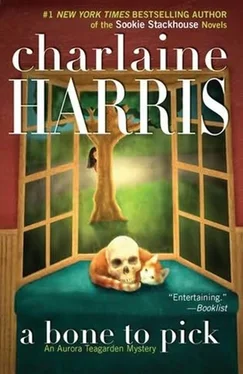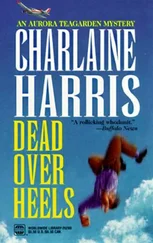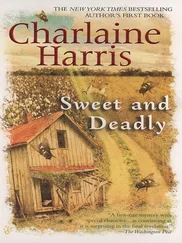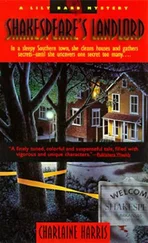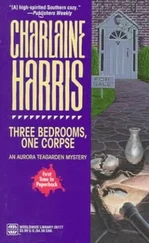“Yeah. He is a jerk.”
“So I was glad when he moved. Then we had a housepainter, Mark Kaplan…” She seemed to be drifting off, and I thought her eyes closed behind the dark glasses.
“What happened to him?” I asked politely.
“Oh. He was the only one who ever left in the night without paying the rent.”
“Gosh. Just skipped out? Bag and baggage?” Maybe another candidate for the skull?
“Yep. Well, he took some of his stuff. He never came back for the rest. You sure you don’t want a drink? I have some real tea, you know.”
Unexpectedly, Marcia smiled, and I smiled back.
“No, thanks. You were saying about your tenant?”
“He ran out. And we haven’t had anyone since. Torrance just doesn’t want to fool with it. The past couple of years, he’s gotten like that. I tell him he must be middle-aged. He and Jane and their big fight over that tree!”
I followed Marcia’s pointing red-tipped finger. There was a tree just about midway between the houses. It had a curiously lopsided appearance, viewed from the Rideouts’ deck.
“It’s just about straddling the property line,” Marcia said. She had a slow, deep voice, very attractive. “You won’t believe, if you’ve got any sense, that people could fight about a tree.”
“People can fight about anything. I’ve been managing some apartments, and the tizzy people get into if someone uses their parking space!”
“Really, I can believe it. Well, as you can see, the tree is a little closer to Jane’s house…your house.” Marcia took another sip from her drink. “But Torrance didn’t like those leaves, he got sick of raking them. So he talked to Jane about taking the tree down. It wasn’t shading either house, really. Well, Jane had a fit. She really got hot. So Torrance just cut the branches that were over our property line. Ooo, Jane stomped over here the next day, and she said, ‘Now, Torrance Rideout, that was petty. I have a bone to pick with you.’ I wonder what the origin of that saying is? You happen to know?”
I shook my head, fascinated with the little story and Marcia’s digression.
“There wasn’t any putting the branches back, they were cut to hell,” said Marcia flatly, her southern accent roughening. “And somehow Torrance got Jane calmed down. But things never were the same after that, between Torrance and Jane. But Jane and I still spoke, and we were on the board of the orphans’ home together. I liked her.”
I had a hard time picturing Jane that angry. Jane had been a pleasant person, even sweet occasionally, always polite: but she was also extremely conscious of personal property, rather like my mother.
Jane didn’t have or want much in the way of things, but what she had was hers absolutely, not to be touched by other hands without proper permission being asked and granted. I saw from Marcia’s little story how far that sense of property went. I was learning a lot about Jane now that it was too late. I hadn’t known she’d been on the board of the orphans’ home, actually and less bluntly named Mortimer House.
“Well,” Marcia continued slowly, “at least the past couple of years they’d been getting along fine, Jane and Torrance…she forgave him, I guess. I’m sleepy now.”
“I’m sorry you had the trouble with Jane,” I said, feeling that somehow I should apologize for my benefactress. “She was always such an intelligent, interesting person.” I stood to leave; Marcia’s eyes were closed behind her sunglasses, I thought.
“Shoot, the fight she had with Torrance was nothin‘, you should have heard her and Carey go to it.”
“When was that?” I asked, trying to sound indifferent.
But Marcia Rideout was asleep, her hand still wrapped around her drink.
I trudged back to my task, sweating in the sun, worried about Marcia burning since she’d fallen asleep on the lounge. But she’d been slathered with oil. I made a mental note to look out the back from time to time to see if she was still there.
It was hard for me to picture Jane being furious with anyone and marching over to tell him about it. Of course, I’d never owned property. Maybe I would be the same way now. Neighbors could get very upset over things uninvolved people would laugh about. I remembered my mother, a cool and elegant Lauren Bacall type, telling me she was going to buy a rifle and shoot her neighbor’s dog if it woke her up with its barking again. She had gone to the police instead and gotten a court order against the dog’s owner after the police chief, an old friend, had come to her house and sat in the dark listening to the dog yapping one night. The dog’s owner hadn’t spoken to Mother since, and in fact had been transferred to another city, without the slightest sign of their mutual disgust slackening.
I wondered what Jane had fought with Carey about. It was hard to see how this could relate to my immediate problem, the skull; it sure wasn’t the skull of Carey Osland or Torrance Rideout. I couldn’t imagine Jane killing the Rideouts’ tenant, Mark whatever-his-name-was, but at least I had the name of another person who might be The Skull.
Back in my house once again-I was practicing saying “my house”-I began to search for Jane’s papers. Everyone had some cache of cancelled checks, old receipts, car papers, and tax stuff. I found Jane’s in the guest bedroom, sorted into floral-patterned cardboard boxes by year. Jane kept everything, and she kept all those papers for seven years, I discovered. I sighed, swore, and opened the first box.
I plugged in Jane's television and listened to the news with one ear while I went through Jane’s papers. Apparently all the papers to do with the car had already been handed over to Parnell Engle, for there were no old inspection receipts or anything like that. It would have helped if Jane had kept all these papers in some kind of category, I told myself grumpily, trying not to think of my own jumble of papers in shoe boxes in my closet.
I’d started with the earliest box, dated seven years ago. Jane had kept receipts that surely could be thrown away now; dresses she’d bought, visits by the bug-spray man, the purchase of a telephone. I began sorting as I looked, the pile of definite discards getting higher and higher.
There’s a certain pleasure in throwing things away. I was concentrating contentedly, so it took me awhile to realize I was hearing some kind of sound from outside. Someone seemed to be doing something to the screen door in the kitchen. I sat hunched on the living room floor, listening with every molecule. I reached over and switched off the television. Gradually I relaxed. Whatever was being done, it wasn’t being done surreptitiously. Whatever the sound was, it escalated.
I stiffened my spine and went to investigate. I opened the wooden door cautiously, just as the noise repeated. Hanging spread-eagled on the screen door was a very large, very fat orange cat. This seemed to explain the funny snags I’d noticed on the screen when I went in the backyard earlier.
“Madeleine?” I said in amazement.
The cat gave a dismal yowl and dropped from the screen to the top step. Unthinkingly, I opened the door, and Madeleine was in in a flash.
“You wouldn’t think a cat so fat could move so fast,” I said.
Madeleine was busy stalking through her house, sniffing and rubbing her side against the door frames.
To say I was in a snit would be putting it mildly. This cat was now Parnell and Leah’s. Jane knew I was not partial to pets, not at all. My mother had never let me have one, and gradually her convictions about pet hygiene and inconvenience had influenced me. Now I would have to call Parnell, talk with him again, either take the cat to him or get him to come get the cat… she would probably scratch me if I tried to put her in my car… another complication in my life. I sank into one of the kitchen chairs and rested my head on my hands dismally.
Читать дальше
